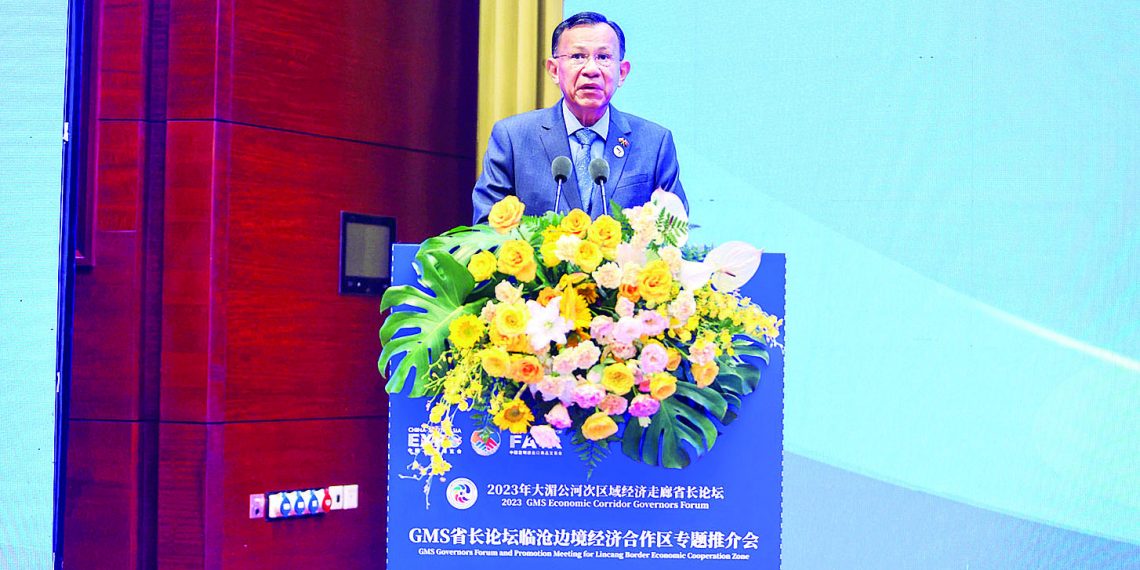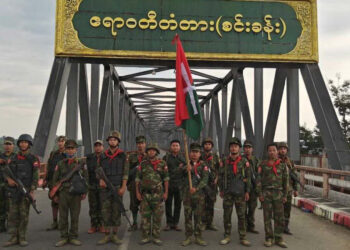As sickness and starvation increasingly stalk the people of Myanmar during the intensifying post-coup economic crisis, China and Russia are continuing to increase their ties with the pariah regime—and humanitarian assistance is not at the top of their lists.
Since early September, at least 11 junta ministers and Union-level officials have visited China and Russia, signing agreements and memoranda of understanding.
The governor of the Central Bank of Myanmar and Union Election Commission officials have both visited Russia and China.
Agreements on cooperation in banking, tourism and elections were signed with Russia, and agreements on export of fishery and livestock products, and pest control were signed with China.
Faced with diplomatic isolation and economic sanctions, the regime is increasingly reliant on China and Russia to acquire weapons, foreign investment and trade, and diplomatic support on the international stage.
The regime is approving investments from China and Russia without oversight—parliament no longer exists, while civil society and independent media have been crushed.
China has 597 investment projects in Myanmar totaling US$21.863 billion in value, junta investment and foreign economic relations minister Kan Zaw told the Greater Mekong Sub-region Economic Corridor Governors Forum held in China’s Kunming in August.

Chinese investment accounts for 23.5 percent of total foreign investment in Myanmar, the majority of which is in the electricity sector, the minister added. The regime is increasingly reliant on China for electricity production as blackouts have become longer and more frequent since the coup.
After its initial reluctance to engage with the junta after its 2021 coup, China quickly rekindled its ties with the generals.
Beijing is building a railway linking Rakhine State’s Kyaukphyu with the key border town of Muse in Shan State via Myanmar’s second-largest city, Mandalay. The railroad is part of the China-Myanmar Economic Corridor, which is itself a part of the Belt and Road Initiative.
According to the junta’s foreign ministry, China is funding 92 projects worth $27.4 million in Myanmar through the Mekong-Lancang Cooperation Special Fund.
In early March, the regime and China signed an agreement to implement three wind-power projects in western Myanmar’s Rakhine State. The junta’s electricity minister has also invited the government of Yunnan province and Chinese businesspeople to invest in the country’s electricity sector.
In April, Wang Ning, a member of the Communist Party of China (CPC) central committee and secretary of the CPC Yunnan provincial committee, met junta boss Min Aung Hlaing in Naypyitaw, signing agreements on rice, agricultural produce and fertilizer trade, as well as power-purchase agreements.
Meanwhile, the relationship between Myanmar military and Russia has gone far beyond the ties between arms supplier and buyer. The two have been cooperating in a wide range of sectors, from economy and trade to diplomacy and nuclear technology.
Russian delegations and representatives of hundreds of Russian companies have visited Myanmar. The regime and Russia have signed agreements on cooperation in trade, tourism, and media as well as a villa project, wind power project, as well as the export of rice, coffee and fishery products from Myanmar.
With support from Moscow, Myanmar opened its first nuclear information center in Yangon in February this year. The two countries also launched direct flights this month.
China and Russia have not only provided the regime with the support it needs on the international stage, but have also sold weapons to the regime that have been used to slaughter dissidents and other civilians.
The regime has imported at least $1 billion worth of weapons and related materials from Russia, China and other countries since the coup, according to a report published in May by Tom Andrews, the UN Special Rapporteur on Myanmar.
The report listed $406 million in sales from Russian entities and $267 million from China, including some state-owned companies.
During his recent visit to Moscow, junta foreign minister Than Swe said the relations between Myanmar and Russia had peaked. The junta’s deputy science and technology minister, Aung Zeya, also urged China to help the regime use advanced nuclear technology during the second China-ASEAN Forum on Peaceful Use of Nuclear Technology last week.

















